2025年中考英语复习 第11节 非谓语动词-课件
文档属性
| 名称 | 2025年中考英语复习 第11节 非谓语动词-课件 |  | |
| 格式 | pptx | ||
| 文件大小 | 124.7KB | ||
| 资源类型 | 试卷 | ||
| 版本资源 | 通用版 | ||
| 科目 | 英语 | ||
| 更新时间 | 2025-01-21 16:28:28 | ||
图片预览

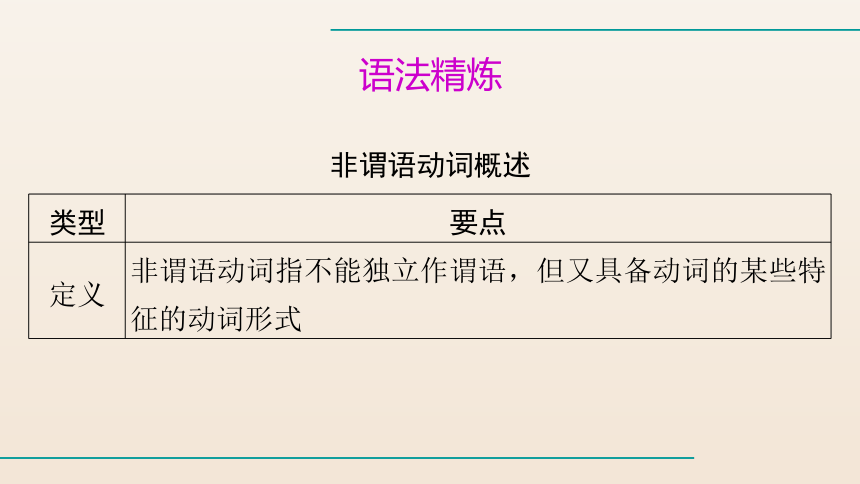
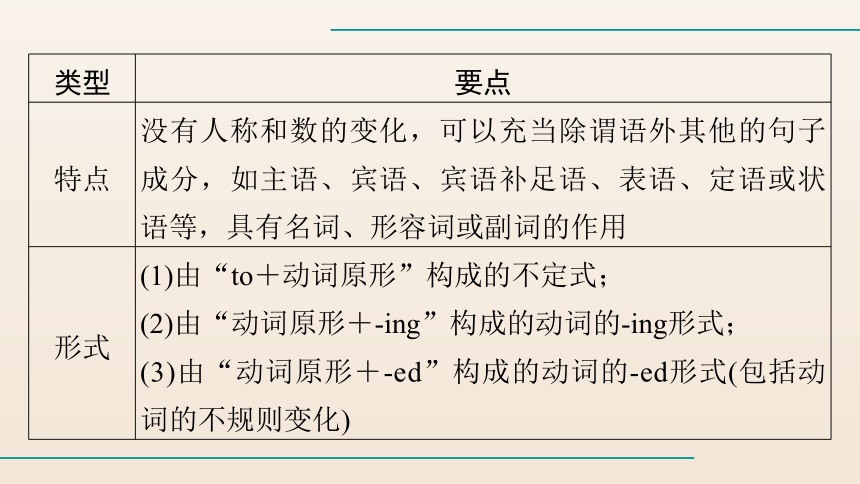
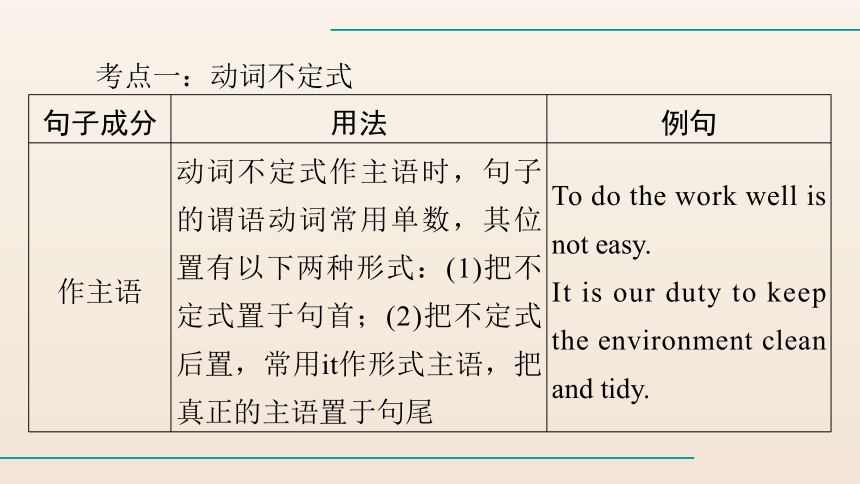
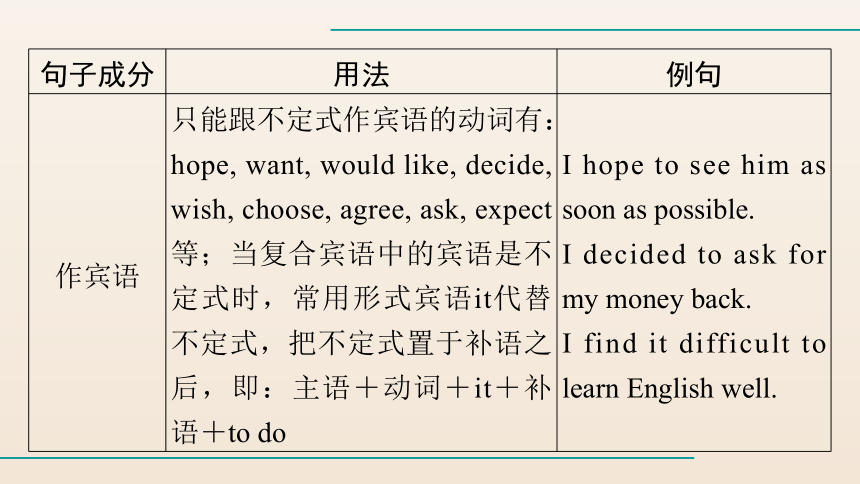
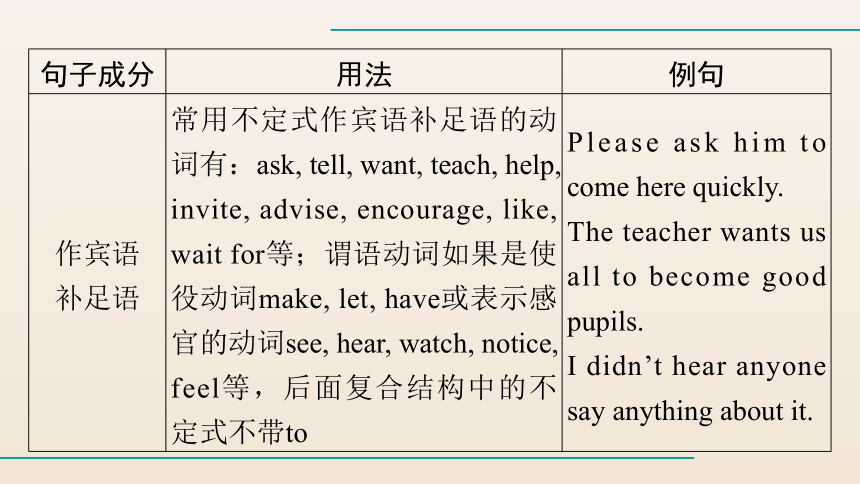

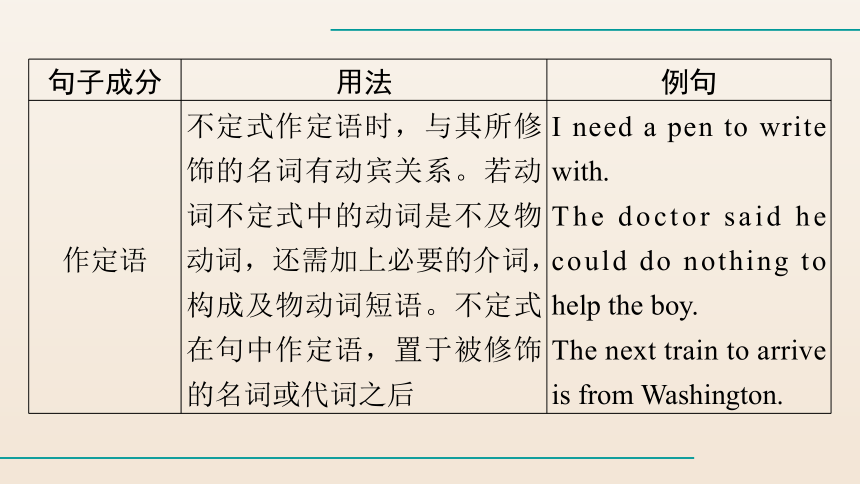
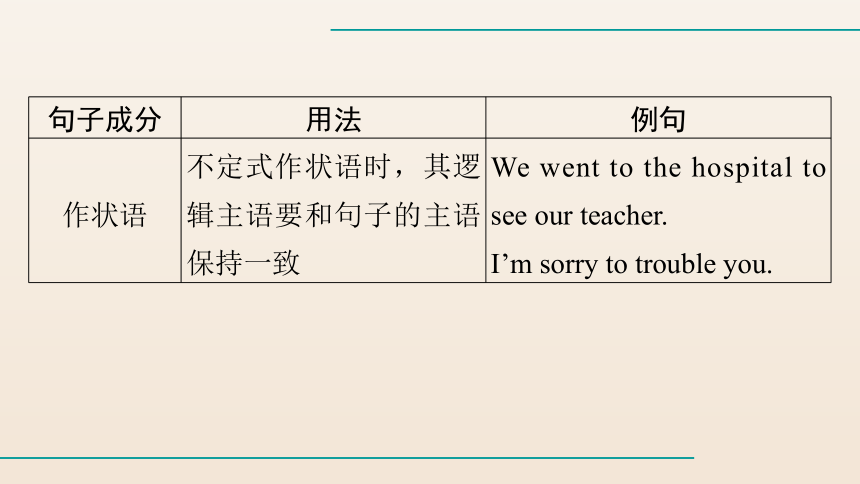
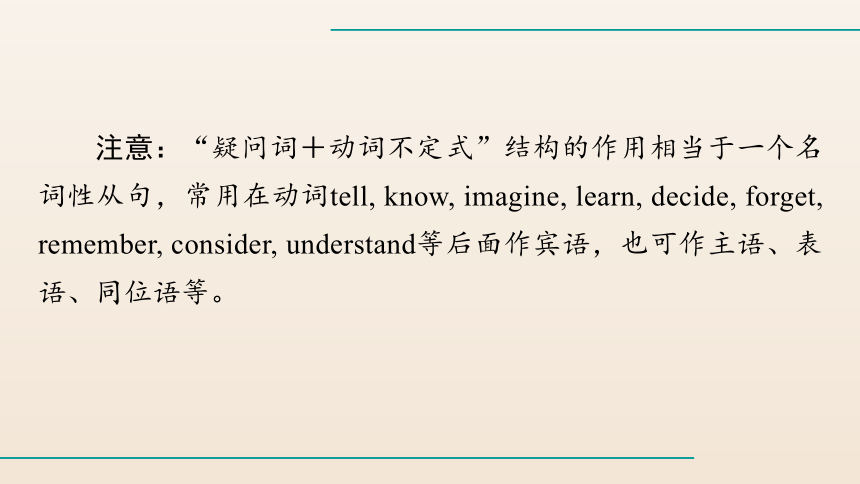
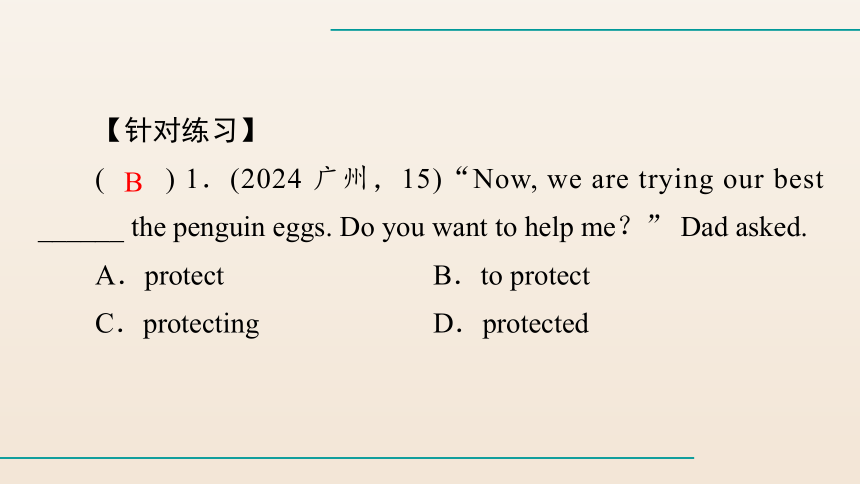
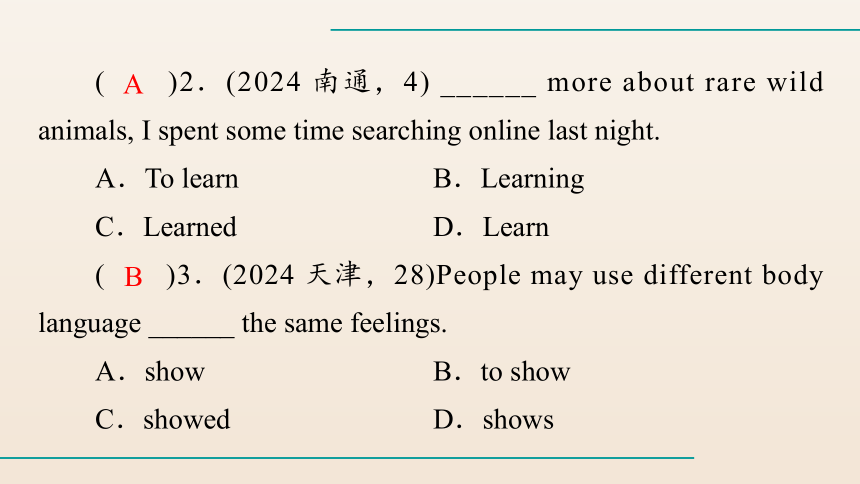
文档简介
(共40张PPT)
第一部分 中考语法知识
第十一节 非谓语动词
非谓语动词概述
类型 要点
定义 非谓语动词指不能独立作谓语,但又具备动词的某些特征的动词形式
语法精炼
类型 要点
特点 没有人称和数的变化,可以充当除谓语外其他的句子成分,如主语、宾语、宾语补足语、表语、定语或状语等,具有名词、形容词或副词的作用
形式 (1)由“to+动词原形”构成的不定式;
(2)由“动词原形+-ing”构成的动词的-ing形式;
(3)由“动词原形+-ed”构成的动词的-ed形式(包括动词的不规则变化)
考点一:动词不定式
句子成分 用法 例句
作主语 动词不定式作主语时,句子的谓语动词常用单数,其位置有以下两种形式:(1)把不定式置于句首;(2)把不定式后置,常用it作形式主语,把真正的主语置于句尾 To do the work well is not easy.
It is our duty to keep the environment clean and tidy.
句子成分 用法 例句
作宾语 只能跟不定式作宾语的动词有:hope, want, would like, decide, wish, choose, agree, ask, expect等;当复合宾语中的宾语是不定式时,常用形式宾语it代替不定式,把不定式置于补语之后,即:主语+动词+it+补语+to do I hope to see him as soon as possible.
I decided to ask for my money back.
I find it difficult to learn English well.
句子成分 用法 例句
作宾语 补足语 常用不定式作宾语补足语的动词有:ask, tell, want, teach, help, invite, advise, encourage, like, wait for等;谓语动词如果是使役动词make, let, have或表示感官的动词see, hear, watch, notice, feel等,后面复合结构中的不定式不带to Please ask him to come here quickly.
The teacher wants us all to become good pupils.
I didn’t hear anyone say anything about it.
句子成分 用法 例句
作表语 不定式作表语表示具体动作或将来动作;当主语是duty, wish, idea, job, dream, plan等词时,作表语的非谓语动词常用不定式,以说明主语的内容 To see is to believe.
Our plan is to finish the work in a month.
句子成分 用法 例句
作定语 不定式作定语时,与其所修饰的名词有动宾关系。若动词不定式中的动词是不及物动词,还需加上必要的介词,构成及物动词短语。不定式在句中作定语,置于被修饰的名词或代词之后 I need a pen to write with.
The doctor said he could do nothing to help the boy.
The next train to arrive is from Washington.
句子成分 用法 例句
作状语 不定式作状语时,其逻辑主语要和句子的主语保持一致 We went to the hospital to see our teacher.
I’m sorry to trouble you.
注意:“疑问词+动词不定式”结构的作用相当于一个名词性从句,常用在动词tell, know, imagine, learn, decide, forget, remember, consider, understand等后面作宾语,也可作主语、表语、同位语等。
【针对练习】
( ) 1.(2024 广州,15)“Now, we are trying our best ______ the penguin eggs. Do you want to help me?” Dad asked.
A.protect B.to protect
C.protecting D.protected
B
( )2.(2024 南通,4) ______ more about rare wild animals, I spent some time searching online last night.
A.To learn B.Learning
C.Learned D.Learn
( )3.(2024 天津,28)People may use different body language ______ the same feelings.
A.show B.to show
C.showed D.shows
A
B
( )4.(2024 扬州,5)China has made great efforts ______ other countries build high-speed railways.
A.help B.to help
C.helping D.helped
( )5.(2024 云南,9)Our headmaster will invite a scientist ______ us a speech on space technology.
A.give B.given
C.giving D.to give
B
D
考点二:动词的-ing形式
句子成分 用法 例句
作主语 动词的-ing形式作主语时,可以像动词不定式一样,用形式主语it代替,而把动词的-ing形式置于句中或句尾 Learning from others is important.
It’s no good learning English without speaking it.
句子成分 用法 例句
作宾语 (1)有些动词需用动词的-ing形式来作宾语,如mind, suggest等; (2)介词后接动词的-ing形式作宾语 Please stop smoking in the house.
What about having some grapes?
句子成分 用法 例句
作表语 动词的-ing形式作表语时相当于名词,说明主语的含义及内容,它与主语是同等关系 My hobby is swimming.
作定语 动词的-ing形式作定语时,表示它所修饰的名词的性能和用途 He slept in the sleeping bag.
注意:
(1)有些动词后面既可以接动词不定式,又可以接动词的-ing形式,意义没有明显区别。如:
begin to do/doing sth. 开始做某事
start to do/doing sth. 开始做某事
hate to do/doing sth. 讨厌做某事
love/like to do/doing sth. 喜欢做某事
(2)有些动词后面既可以接动词不定式,又可以接动词的-ing形式,意义区别较大。如:
remember to do sth. 记得做某事(还未做)
remember doing sth. 记得做过某事(做过了)
forget to do sth. 忘记做某事(还未做)
forget doing sth. 忘记做过某事(做过了)
regret to do sth. 遗憾去做某事(还未做)
regret doing sth. 后悔做过某事(做过了)
try to do sth. 努力做某事
try doing sth. 尝试做某事
stop to do sth. 停下来去做某事
stop doing sth. 停止做某事
(3)后接动词的-ing形式作宾语的常考动词(短语):
avoid避免;consider考虑;enjoy喜爱;finish完成;imagine想象;keep保持;mind介意;miss错过;risk冒险;practice练习;suggest建议;look forward to期待; succeed in成功;give up 放弃;keep on继续;feel like想要;get/be used to习惯
【针对练习】
( )1.(2024 广州,14)So the government is taking action to stop people ______ for a whole season every year.
A.fish B.fished
C.to fish D.fishing
D
( )2.(2024 宿迁,3)By reading the public signs, he had no difficulty in ______ the shopping mall.
A.find B.found
C.to find D.finding
( )3.(2024 西藏,31)I think ______ resolutions at the beginning of a year is a good way to improve our lives.
A.making B.make
C.makes D.made
D
A
( )4.(2024 兴安盟,9)The teachers used to ______ key points on the blackboard, but now they are getting used to ______ them through PPTs.
A.write; showing B.writing; show
C.write; show D.writing; showing
A
( )5.—Did you talk back to your mother when you were a child
—Yes. But now I realize I was wrong. I really regret ______ that silly thing to her.
A.do B.to do
C.doing D.done
C
一、单项选择
( )1.What ways can you think of ______ out the physics problem
A.to work B.working
C.work D.worked
A
( )2.My English teacher often encourages me ______ my spoken English in and after class.
A.practicing B.practices
C.to practice D.practiced
( )3.When I am feeling unhappy, I usually prefer ______ some sports ______ myself up.
A.to do; to cheering B.doing; to cheering
C.do; to cheer D.to do; to cheer
C
B
( )4.Yunnan Museum is such an interesting place that many kids have fun ______ it.
A.visiting B.to visit
C.visit D.visited
A
( )5.—Please stay with me this weekend.
—I’m sorry, but my father and I planned ______ Beijing a long time ago.
A.visit B.visiting
C.to visit D.visited
C
( )6.—Do you have any plans for the holiday
—Yes, I’m planning to travel to Jiuzhaigou. I’m looking forward to ______ the colorful lakes and amazing waterfalls.
A.see B.seeing
C.sees D.saw
B
( )7.We are supposed ______ some housework with our parents when we have free time.
A.to share B.sharing
C.shared D.share
( )8.My parents don’t allow me ______ TV on school nights.
A.to watch B.watch
C.watches D.watching
A
A
( )9.—You have no idea what great difficulty I had ______ to get the work done.
—But it is well worth ______.
A.managing; trying B.to manage; trying
C.managing; being tried D.managed; to be tried
A
( )10.The teachers often tell us ______ in the river. It’s dangerous.
A.not swim B.don’t swim
C.not swimming D.not to swim
( )11.He took off his expensive watch ______ the fact that he was rich.
A.to hide B.hid
C.hide D.hidden
D
A
( )12.It is wise ______ Linda to make up her mind ______ to play an instrument.
A.for; learning B.for; to learn
C.of; learning D.of; to learn
D
( )13.—I have trouble ______ the new word. Can you help me
—Sure. You can look it up in the dictionary.
A.understanding B.to understand
C.understand D.understood
A
( )14.UNICEF always pays great attention to ______ poor children all over the world ______ better education.
A.helping; receiving B.help; to receive
C.helping; receive D.help; receiving
C
( )15.—Have you decided how to go to Nanjing
—Not yet. I suggest ______ there while my parents advise me ______ a train there.
A.driving; taking B.to drive; to take
C.driving; to take D.to drive; taking
C
二、完成句子
1.For Tom, it is a joyful thing _____ _____ _____ _____ her.
对汤姆来说,照顾她是一件快乐的事情。
2.I hope ____ ______ ______ you soon.
我希望尽快收到你的来信。
to take care of
to hear from
3.We can also relax ourselves by _________ ____ ______ or doing some sports.
我们也可以通过听音乐或做一些运动来放松自己。
4.____ ______ ____ ______ _________ , we also collected recyclable waste.
为了节约资源,我们还收集了可回收的废品。
listening to music
In order to save resources
5.For safety, drivers must ______ _________ while driving.
出于安全考虑,司机驾驶时必须避免吸烟。
6.They offered courses _____ _______ students know the importance of __________ the Yellow River.
他们开设课程来帮助学生了解保护黄河的重要性。
avoid smoking
to help
protecting
7.Sometimes she explained ______ ____ ____ the key words and sentence patterns.
有时,她解释如何使用关键词和句型。
8.I want ____ ____ a volunteer, because ________ ______ ________ makes me feel good.
我想成为一名志愿者,因为帮助别人让我感觉很好。
how to use
to be
helping other
people
第一部分 中考语法知识
第十一节 非谓语动词
非谓语动词概述
类型 要点
定义 非谓语动词指不能独立作谓语,但又具备动词的某些特征的动词形式
语法精炼
类型 要点
特点 没有人称和数的变化,可以充当除谓语外其他的句子成分,如主语、宾语、宾语补足语、表语、定语或状语等,具有名词、形容词或副词的作用
形式 (1)由“to+动词原形”构成的不定式;
(2)由“动词原形+-ing”构成的动词的-ing形式;
(3)由“动词原形+-ed”构成的动词的-ed形式(包括动词的不规则变化)
考点一:动词不定式
句子成分 用法 例句
作主语 动词不定式作主语时,句子的谓语动词常用单数,其位置有以下两种形式:(1)把不定式置于句首;(2)把不定式后置,常用it作形式主语,把真正的主语置于句尾 To do the work well is not easy.
It is our duty to keep the environment clean and tidy.
句子成分 用法 例句
作宾语 只能跟不定式作宾语的动词有:hope, want, would like, decide, wish, choose, agree, ask, expect等;当复合宾语中的宾语是不定式时,常用形式宾语it代替不定式,把不定式置于补语之后,即:主语+动词+it+补语+to do I hope to see him as soon as possible.
I decided to ask for my money back.
I find it difficult to learn English well.
句子成分 用法 例句
作宾语 补足语 常用不定式作宾语补足语的动词有:ask, tell, want, teach, help, invite, advise, encourage, like, wait for等;谓语动词如果是使役动词make, let, have或表示感官的动词see, hear, watch, notice, feel等,后面复合结构中的不定式不带to Please ask him to come here quickly.
The teacher wants us all to become good pupils.
I didn’t hear anyone say anything about it.
句子成分 用法 例句
作表语 不定式作表语表示具体动作或将来动作;当主语是duty, wish, idea, job, dream, plan等词时,作表语的非谓语动词常用不定式,以说明主语的内容 To see is to believe.
Our plan is to finish the work in a month.
句子成分 用法 例句
作定语 不定式作定语时,与其所修饰的名词有动宾关系。若动词不定式中的动词是不及物动词,还需加上必要的介词,构成及物动词短语。不定式在句中作定语,置于被修饰的名词或代词之后 I need a pen to write with.
The doctor said he could do nothing to help the boy.
The next train to arrive is from Washington.
句子成分 用法 例句
作状语 不定式作状语时,其逻辑主语要和句子的主语保持一致 We went to the hospital to see our teacher.
I’m sorry to trouble you.
注意:“疑问词+动词不定式”结构的作用相当于一个名词性从句,常用在动词tell, know, imagine, learn, decide, forget, remember, consider, understand等后面作宾语,也可作主语、表语、同位语等。
【针对练习】
( ) 1.(2024 广州,15)“Now, we are trying our best ______ the penguin eggs. Do you want to help me?” Dad asked.
A.protect B.to protect
C.protecting D.protected
B
( )2.(2024 南通,4) ______ more about rare wild animals, I spent some time searching online last night.
A.To learn B.Learning
C.Learned D.Learn
( )3.(2024 天津,28)People may use different body language ______ the same feelings.
A.show B.to show
C.showed D.shows
A
B
( )4.(2024 扬州,5)China has made great efforts ______ other countries build high-speed railways.
A.help B.to help
C.helping D.helped
( )5.(2024 云南,9)Our headmaster will invite a scientist ______ us a speech on space technology.
A.give B.given
C.giving D.to give
B
D
考点二:动词的-ing形式
句子成分 用法 例句
作主语 动词的-ing形式作主语时,可以像动词不定式一样,用形式主语it代替,而把动词的-ing形式置于句中或句尾 Learning from others is important.
It’s no good learning English without speaking it.
句子成分 用法 例句
作宾语 (1)有些动词需用动词的-ing形式来作宾语,如mind, suggest等; (2)介词后接动词的-ing形式作宾语 Please stop smoking in the house.
What about having some grapes?
句子成分 用法 例句
作表语 动词的-ing形式作表语时相当于名词,说明主语的含义及内容,它与主语是同等关系 My hobby is swimming.
作定语 动词的-ing形式作定语时,表示它所修饰的名词的性能和用途 He slept in the sleeping bag.
注意:
(1)有些动词后面既可以接动词不定式,又可以接动词的-ing形式,意义没有明显区别。如:
begin to do/doing sth. 开始做某事
start to do/doing sth. 开始做某事
hate to do/doing sth. 讨厌做某事
love/like to do/doing sth. 喜欢做某事
(2)有些动词后面既可以接动词不定式,又可以接动词的-ing形式,意义区别较大。如:
remember to do sth. 记得做某事(还未做)
remember doing sth. 记得做过某事(做过了)
forget to do sth. 忘记做某事(还未做)
forget doing sth. 忘记做过某事(做过了)
regret to do sth. 遗憾去做某事(还未做)
regret doing sth. 后悔做过某事(做过了)
try to do sth. 努力做某事
try doing sth. 尝试做某事
stop to do sth. 停下来去做某事
stop doing sth. 停止做某事
(3)后接动词的-ing形式作宾语的常考动词(短语):
avoid避免;consider考虑;enjoy喜爱;finish完成;imagine想象;keep保持;mind介意;miss错过;risk冒险;practice练习;suggest建议;look forward to期待; succeed in成功;give up 放弃;keep on继续;feel like想要;get/be used to习惯
【针对练习】
( )1.(2024 广州,14)So the government is taking action to stop people ______ for a whole season every year.
A.fish B.fished
C.to fish D.fishing
D
( )2.(2024 宿迁,3)By reading the public signs, he had no difficulty in ______ the shopping mall.
A.find B.found
C.to find D.finding
( )3.(2024 西藏,31)I think ______ resolutions at the beginning of a year is a good way to improve our lives.
A.making B.make
C.makes D.made
D
A
( )4.(2024 兴安盟,9)The teachers used to ______ key points on the blackboard, but now they are getting used to ______ them through PPTs.
A.write; showing B.writing; show
C.write; show D.writing; showing
A
( )5.—Did you talk back to your mother when you were a child
—Yes. But now I realize I was wrong. I really regret ______ that silly thing to her.
A.do B.to do
C.doing D.done
C
一、单项选择
( )1.What ways can you think of ______ out the physics problem
A.to work B.working
C.work D.worked
A
( )2.My English teacher often encourages me ______ my spoken English in and after class.
A.practicing B.practices
C.to practice D.practiced
( )3.When I am feeling unhappy, I usually prefer ______ some sports ______ myself up.
A.to do; to cheering B.doing; to cheering
C.do; to cheer D.to do; to cheer
C
B
( )4.Yunnan Museum is such an interesting place that many kids have fun ______ it.
A.visiting B.to visit
C.visit D.visited
A
( )5.—Please stay with me this weekend.
—I’m sorry, but my father and I planned ______ Beijing a long time ago.
A.visit B.visiting
C.to visit D.visited
C
( )6.—Do you have any plans for the holiday
—Yes, I’m planning to travel to Jiuzhaigou. I’m looking forward to ______ the colorful lakes and amazing waterfalls.
A.see B.seeing
C.sees D.saw
B
( )7.We are supposed ______ some housework with our parents when we have free time.
A.to share B.sharing
C.shared D.share
( )8.My parents don’t allow me ______ TV on school nights.
A.to watch B.watch
C.watches D.watching
A
A
( )9.—You have no idea what great difficulty I had ______ to get the work done.
—But it is well worth ______.
A.managing; trying B.to manage; trying
C.managing; being tried D.managed; to be tried
A
( )10.The teachers often tell us ______ in the river. It’s dangerous.
A.not swim B.don’t swim
C.not swimming D.not to swim
( )11.He took off his expensive watch ______ the fact that he was rich.
A.to hide B.hid
C.hide D.hidden
D
A
( )12.It is wise ______ Linda to make up her mind ______ to play an instrument.
A.for; learning B.for; to learn
C.of; learning D.of; to learn
D
( )13.—I have trouble ______ the new word. Can you help me
—Sure. You can look it up in the dictionary.
A.understanding B.to understand
C.understand D.understood
A
( )14.UNICEF always pays great attention to ______ poor children all over the world ______ better education.
A.helping; receiving B.help; to receive
C.helping; receive D.help; receiving
C
( )15.—Have you decided how to go to Nanjing
—Not yet. I suggest ______ there while my parents advise me ______ a train there.
A.driving; taking B.to drive; to take
C.driving; to take D.to drive; taking
C
二、完成句子
1.For Tom, it is a joyful thing _____ _____ _____ _____ her.
对汤姆来说,照顾她是一件快乐的事情。
2.I hope ____ ______ ______ you soon.
我希望尽快收到你的来信。
to take care of
to hear from
3.We can also relax ourselves by _________ ____ ______ or doing some sports.
我们也可以通过听音乐或做一些运动来放松自己。
4.____ ______ ____ ______ _________ , we also collected recyclable waste.
为了节约资源,我们还收集了可回收的废品。
listening to music
In order to save resources
5.For safety, drivers must ______ _________ while driving.
出于安全考虑,司机驾驶时必须避免吸烟。
6.They offered courses _____ _______ students know the importance of __________ the Yellow River.
他们开设课程来帮助学生了解保护黄河的重要性。
avoid smoking
to help
protecting
7.Sometimes she explained ______ ____ ____ the key words and sentence patterns.
有时,她解释如何使用关键词和句型。
8.I want ____ ____ a volunteer, because ________ ______ ________ makes me feel good.
我想成为一名志愿者,因为帮助别人让我感觉很好。
how to use
to be
helping other
people
